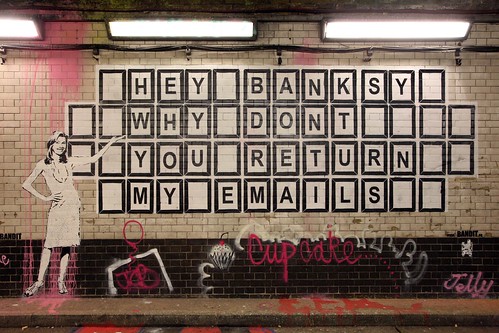 I'm a member of 100 or more online communities. Come to think of it, it has to be more.
I'm a member of 100 or more online communities. Come to think of it, it has to be more.I pretty much sign up for everything anyone recommends to me. Keeping abreast of the latest developments in the networked world is important in my job.
But it's also important for all of us as we become the eighth mass media.
We store some pictures here, others there. We find some music here, some there. Video likewise. There are our profiles in ecommerce to manage, multiple blogs, our bank accounts, competitions we enter, events we plan on attending...
That's before we get to our multiple profiles and interaction on social networks and through social media. Representations of our digital selves - with a heap of helpful meta data attached, are spread throughout the web. And we merrily distribute all this with no considerations for silos. We go beyond them without even acknowleding they are there.
So if I asked you to write a list detailing what and where, you wouldn't be able to complete one.
And if I asked you to confirm your username and password for each of these - you'd struggle even more.
Few of us are organised enough to keep lists in secure places and back up multiple versions.
So how is that our networks don't collapse out of simple forgetfulness - or even through our failure to personally persist?
How do we keep track of all this? How do we open the doors when we lose vital passwords?
There are two hubs right now which go beyond the silos: your email address and your mobile phone number.
It's clear to me that right now that email address remains the core one.
In my case, my gmail address is where the alerts and reminders arrive, where lost account details can be sent to. It's a sign-in for some functions, too. Gmail even has todo lists now. Without my gmail account my network would be at risk of collapse. Your phone number performs a similar function in the other digital world of peer-to-peer - sms text messaging and calls.
So for all the demand for our own portable id we can take from social network to social network, we already all have a simple, ubiquitous id which acts to collate our disparate identities and metadata - our email accounts.
Yes email has its problems, email has its spam, email has its overloads. But even if you ONLY use it for registering yourself throughout the web, you can't deny its fundamental importance in your digital life.
No wonder google came up with a rival for hotmail. Email is the place you are MOST locked into - beyond any individual social network and beyond even the widest reaching of the Open ID-Open Social-Friend Connect continuum.
What we need for the arrival of the eighth mass media is something which is as good at expressing our id and metadata outwardly just as broadly and effectively as your email account can collate it centrally.
What's the closest thing you've found so far?
What is the opposite of email?

Email has come to have these two functions: identity and communication.
ReplyDeleteRe: identity, any URL could work, which is the premise of various identity initiatives, but they are struggling, because, as you point out, people already have a confirmable URL in the form of their email address.
Re: communication -- Twitter et al are consuming alot of the traffic formerly trapped in email. Open public discourse is a lot more interesting than closed, except for truly private communication. That's what email will become, although Twitter and others are def building private communication in, although not to the degree needed (see Scoble Doesn't Like Twitter's Direct Messages http://bit.ly/atiI).
I shall post something at length, later, but for the moment I manage quite well with different passwords for each system, the database of the whole held under encryption.
ReplyDeleteIt's not as hard as you'd think.
Cool, thanks Alex and Stowe. Alex, where do you store your database. Is it backed up in the cloud - and if so how do you access it. I'm just thinking somewhere among the locks and keys must be an email address? Will check out your post,
ReplyDeleteThis comment has been removed by the author.
ReplyDeleteAdriana has written a great response to this post on her blog. Follow the link below )on email, logins, identifiers and identity)
ReplyDeleteThought-provoking post David and I'm in agreement that email *is still* the most accommodating place to base that media mass. What's also clear is there's still no silver bullet, so how we organise our online existence is key.
ReplyDelete